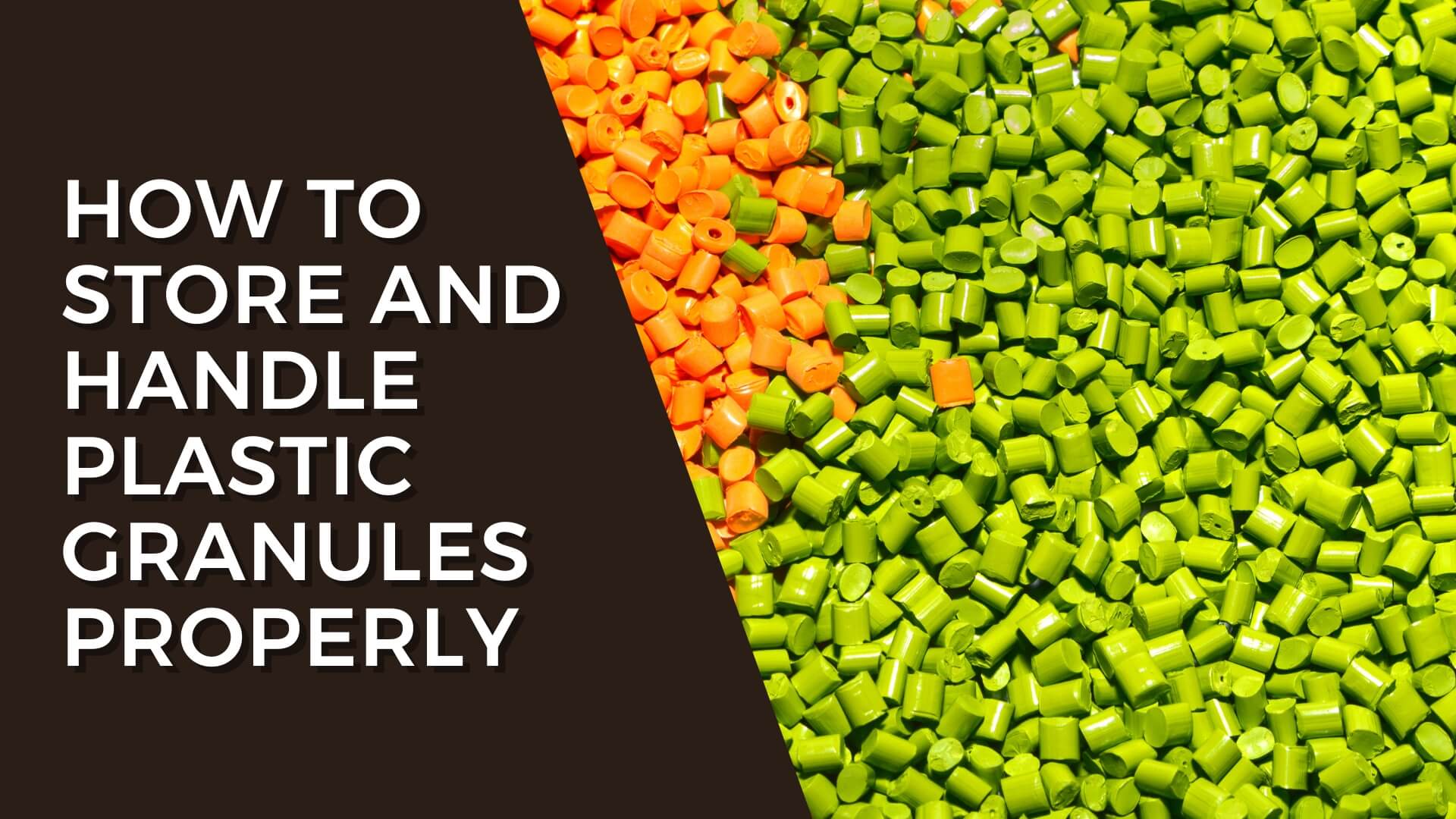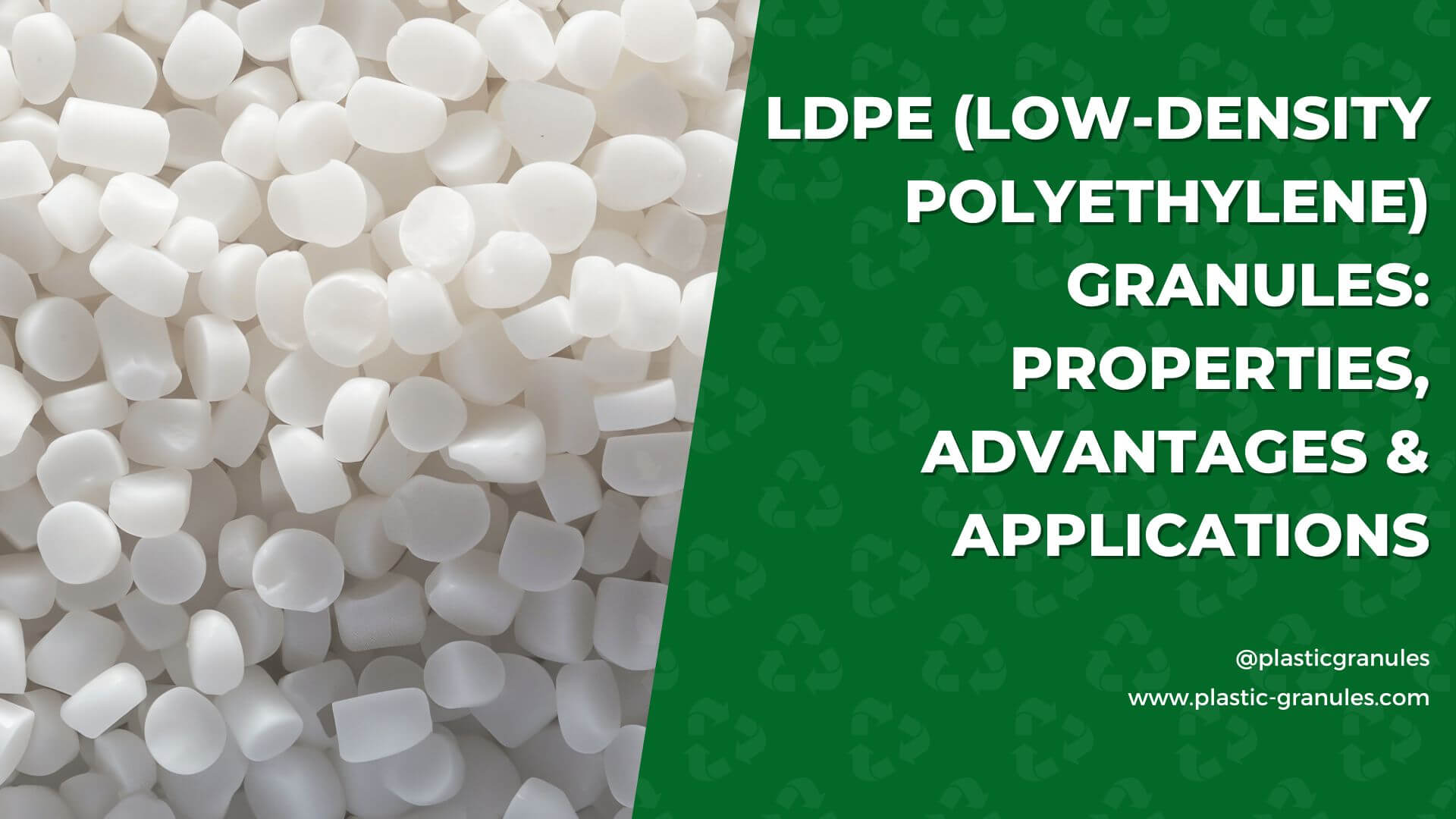In fact, plastic granules are used in a wide range of applications and play an important role in the manufacturing process as they often form the raw materials for thousands of products from several different industries. Quality of final product in terms of performance and reliability is depend on the plastic granules whether it will be used for packaging marks, automotive parts or any industrial part. So proper storage and handling op calcium-supplements are very important to keep their quality intact.
Storage and handling of plastic granules are not just about keeping them in a safe place — they also need to be stored under conditions that prevent degradation and contamination. For example, temperature and humidity while color feedstock granules are placed by the printer head on a build plate will determine how strong or brittle those granules become later in an end product.
In this blog post, we have come up with a complete guide for you to learn how the plastic granules should be stored and handled properly. Good handling practice can keep your granules in tip-top shape, avoid expensive quality issues and production downtime. If you are a Plastic Granules Manufacturer in India or Plastic Granules Supplier in India, it is important for you to know the correct way and importance of these techniques so that it help in getting better results out there.

Importance of Proper Storage
Impact on Quality
Good storage is very important for plastic granules and proper performance of it. Since plastic granules are one of the raw materials used in various industries they highly vulnerable towards environmental condition. Improper storage leads the granules to deform in multiple wrong and corruptive directions.
For example, exposure to high temperatures can soften or melt granules any change in the consistency of these will lead processing problems. Inversely, moisture absorption can cause the granules to stick themselves together when high humidity levels are accompanied and/or degradation of them. Which can impair the uniformity of granules, producing poor-quality end products.
Another major problem is contamination. If the surface of plastic granular comes into contact with particles, dirt or other new material such as dust, it will contaminate and result in defects on finished products. Insufficiently controlled, contamination can also spoil such physical properties as colour and strength in the granules rendering them unsalable for certain applications.
Plastic Granule Quality: The quality of the plastic granules has a direct effect on process efficiency and output. Granules of poor quality can increase waste, downtime and additional costs for reprocess or material replacement. By ensuring correct storage, the granules can retain their original characteristics contributing to an improvement in quality and performance of final products. This is especially important for an LDPE Granules Manufacturer in India.
Cost Implications
Poor storage facilities of– plastic granules will have a serious effect on quality, costing your business far more than just attractive fillings in small jars the problem goes to the need. Storage of forages in plastic bags also results into the problems on quality (Table 9), and economic impact is significant due to discounted rates. Due to this, plastic granules can lose their efficiency over time and cost manufacturers in terms of disposal costs, rework, or purchasing new material against the actual consumption.
Additionally, having to fix quality problems after the fact causes production delays and down time. This impacts the total productive time and it may lead you to miss some deadlines or your productivity output might be reduced. In certain industries having no timely deliverables will have a cascading effect on customer satisfaction, business reputation etc.
Installing efficient storage solutions and ensuring the right conditions for plastic granules can reduce costs because facing these concerns is much more expensive in comparison to preventing them. Using containers effectively allows you to reduce losses, maintain uniform quality of the product and a good organization in manufacturing. With more than 40 years of experience, we work diligently to ensure our customers enjoy the financial and operational benefits that come with storing materials properly.
Ideal Storage Conditions
Temperature Control
It is important to maintain the right temperature in order to preserve the quality of plastic granules. Plastic granules are quite sensitive to temperature changes and extreme heat or cold can affect their properties badly. To store plastic granules in the best manner possible, a controlled environment where temperature is maintained constantly should be provided.
The most favourable temperature range for storing most types of plastic granules is generally between 15°C to 25°C (59°F to 77°F). At temperatures other than this range, there is possibility that some type of damage will occur due to softening, melting or becoming brittle making them unreliable. Extreme heat may cause the plastic itself to degrade and extremely low temperatures make them unduly rigid.
Air-conditioned storage rooms or storage in temperature-controlled rooms should be used to obtain and maintain material temperature. Since the required storage tempera ture is indicated for the material, controls can be based on measuring the ambient temperature only. For this reason, regular checks with ther- mometers or temperature sensors are suf cient and recommended for keeping described
limits of granulate temperature.
Humidity Control
Humidity management is also of utmost importance when it comes to storing plastic granules. High humidity will cause the plastic granules to absorb moisture, resulting in clumping, swelling or degradation of the material. Moisture absorbed granules are difficult to process and may lead to lower quality final products.
To avoid problems due to moisture, the storage of plastic granules has to take place in a dry surroundings and at low relative humidity – preferably not higher than 60 %. The use of dehumidifiers or of humidity control systems in the store-rooms might be required. Plastic granules can also be protected by using such packaging or containers which are proof against moisture.
Ventilation
Enough ventilation is required to prevent moisture from accumulation and ensuring the quality of stored plastic granules. Proper air flow keeps the storage dry and minimizes possibility for condensation, which in turn averts any issues related with moisture.
Make sure that the storage area is well-ventilated and there is an air circulation that does not allow dead air zones. Ventilation not only helps in keeping the right humidity, but also prevents dust and contaminants to settle down on the granules.
Light Exposure
The quality of plastic granules can be affected by exposure to light. This is because, ultraviolet (UV) light in particular, can cause chemical changes in plastics leading to degradation, discolouration and poor performance.
Store plastic granules in a dark or opaque container, and in a storage area that is shaded or kept in the dark. Additionally, you may seal the containers properly and put protective cover onto further minimize exposure of light to the granules to maintain its quality and effectivity.
Storage Equipment and Containers
Choosing the Right Containers
Selecting right kind of containers to store plastic granules is very important to retain their quality and also avoid contamination. The containers should not allow the granules to get affected by moisture, dust or light in environment.
Use containers made from material which are moisture and chemical resistant for storing plastic granules. Use of heavy duty plastic bins, metal drums or bulk bags can be made depending on quantity of granules. Containers should be thoroughly cleaned, dried and should not left with any residues or contaminants before use.
Containers should also be tightly sealed, in order to minimize exposure to air and moisture. Choose containers with tight-fitting lids or closures to help retain the best storage conditions possible. In addition, containers should be clearly labeled with the name of the granules and any special precautions for handling, both for ease of locating and to avoid mix-ups.
Labeling and Segregation
Plastic granules should be labeled properly and segregated in order to have control over your inventory and avoid mix-up of materials. Each container should be labeled with information like type of granules, batch number, date of storage, any special instructions for handling etc.
Segregate plastic granules of different resin types, colours or end use. This will avoid any contamination and easy availability of granules as & when required. On floor/storage racks earmark the location for stacking drums/containers w.r.t. the category to which they belong, thus increasing storage capacity in totality and avoiding mistakes.
Handling Equipment
Appropriate equipment should be used for handling plastic granules to ensure safe and efficient movement. The volume and type of granules will determine the need for various handling tools and machinery.
For small amounts, manual handling tools are appropriate (e.g. scoops/shovels or a forklift if in drums). For larger quantities, conveyor systems can be used and, for most grades of material, pneumatic conveyance is also possible. Alternatively use automated handling equipment.
Ensure all contact parts on the handling equipment are clean as contamination may discolour the granules.
When using handling equipment ensure you do not damage it or spil/drop granules by being too rough with containers or inappropriate use. Maintain your scoops, shovels and brushes etc regularly – it is much easier to keep them clean than try to get them clean after they have become dirty.
Best Practices for Handling Plastic Granules
Minimizing Contamination
Quality of plastic granules has to be maintained and for that care should be taken to avoid any contamination during handling. Plastic granules can get contaminated from various sources such as dust, foreign matter, etc. Hence it is important to take measures to prevent contamination so that quality product is manufactured using these granules.
Measures to be Taken:
- Clean Equipment: Use clean and designated equipment for handling granules. Do not use equipment that has been in contact with other products as it may carry residues which can contaminate the granules.
- Use Protective Gear: Operators should wear gloves and other protective clothing to prevent the transfer of oils, dirt or other impurities from hands to granules.
- Keep all Work Areas Clean: Make sure that your work surfaces and storage areas are kept clean and free of dust and debris, set up in a way to keep them that way. Have regular scheduled cleaning times.
Importance of Cleanliness and Hygiene
It is important to maintain high standards of cleanliness and hygiene in order to prevent contamination. Contaminated granules can cause defects in the final products which might impact their performance and safety. Therefore, regular cleaning and proper handling will help avoid any contaminants entering the granules thus ensuring overall quality of the manufacturing process.
Safe Handling Procedures
Implementation of recommended procedures and imparting required training to personnel is the responsibility that every manufacturer/processor using plastic granules need to undertake for not only ensuring safety during handling; but also, for efficient management of plastic granules.
Recommended Procedures for Safe Handling
- Use Correct Tools: Utilize the specific tools and gears meant for handling plastic granules. This lowers the risk of spills and that granules are transported / stored in safety.
- Follow the Handling Instructions: The handling instructions are different for each type of granule. For example, these may include temperature and humidity ranges of storage conditions to avoid damage or contamination.
- Track Storage Conditions: Check the storage conditions on a regular basis to make sure that they are in compliance. Deal with any problems there and then so that you have a safe handling situation.
Training and Safety Measures for Personnel
Make sure that all workers engaged in activities with plastic granules are trained about safe handling practices. Train your workers to make them aware of safety measures and best practices through regular workshop sessions. Adopt directed safety requirements by labelings, signs and emergency response plans to ensure handling is safe.
Avoiding Damage
At the same time, it is very important to prevent any damage of a physical nature during handling that can affect quality and functionality produced injection molded plastics coming out from pvc granulator. Physical issues may include clumping, fragmentation or degradation of the granules by physical damage which can disrupt economies in manufacturing.
Preventing Physical Damage Tips
- Gentle Handling: The granules should never be dropped or mishandled. Apply good practices to transfer and move granules carefully, thus reducing physical effort.
- Appropriate Storage: Store granules in containers that are environmentally appropriate and will not provide too much compression or impact on the units. The correct storage avoids the granules from crushing and keeps them healthy.
- Inspect Equipment Regularly: It is important to inspect the handling equipment regularly for any kind of wear and tear. Replace or repair equipment, if necessary to prevent problem that may cause a breakage of the granules.
Importance of Careful Handling and Transport
Care should be taken during the handling and transportation of plastic granules to maintain their quality so that they perform as per the expectations in the process and also to avoid any wastage. This will also help in reducing the manufacturing cost.
Monitoring and Maintenance
Regular Inspections
It is important to inspect storage areas and containers regularly to maintain the quality and safety of plastic granules. Regular inspections will help identify potential concerns before they become a problem, ensuring the granules stay in their best state.
Importance of Conducting Regular Inspections
Preventing Contamination: Regular inspection helps in early identification of sources of contamination such as dust, moisture and pests etc., which can effect the granules quality.
Inspections to verify the structural integrity of storage containers and facilities are also performed on a regular basis. Leaks, spills, or other forms of damage could have negative impacts on the granules, so it is important to perform inspections in this area as well.
What to Look for During Inspections:
Check for Contamination: Determine if there is visible evidence of dust, moisture or foreign material-any of which can cause or harbor mold.
Assess Container Condition: Check for cracks, leakage or deterioration-such flaws could not only contaminate materials but also create hazards and liability due to spills.
Review Storage Environment: Verify that the temperature, humidity and lighting levels in your storage area are suitable for the type of granules you will store.
Record Keeping
Keeping detailed records of storage conditions and problems that have occurred is important in order to monitor and maintain storages effectively. Good records facilitate tracking storage practices and making appropriate decisions.
Keeping Detailed Records of Storage Conditions and Issues:
Document environmental conditions: Temperature, humidity, and other factors in the storage area should be logged in order to assure that these are within acceptable limits.
Record Inspections and Findings: Keep track of routine inspections and details of any problems or areas that need work.
Benefits of Keeping Good Records
Improved Traceability: Detailed records make it possible to trace problems back to the source, enabling timely and appropriate reactions that reduce the impact of the problem and help to prevent future issues.
Enhanced Quality Control: Detailed records ensure quality control as they help in determining whether or not changes observed in a sealed granule container may be considered an expected behavior.
Maintenance of Storage Facilities
Regular maintenance of storage facilities is necessary to ensure that they are able to provide suitable conditions for the storage of plastic granules and to prevent problems that may affect the quality and safety of stored materials.
Routine Maintenance Tasks
Inspect and Repair: Conduct regular inspections of the storage facilities for any signs of damage and promptly undertake necessary repairs to ensure a secure environment for the granules.
Clean and Sanitize: Storage areas should be routinely cleaned and sanitized to avoid product contamination. This includes the removal of dust, dirt, or any other contaminants that may be present in the storage environment.
Monitor and Adjust Conditions: Environmental conditions such as temperature and humidity should be continually monitored and adjusted as necessary to maintain optimal storage conditions.
How to Address and Correct Storage Issues Promptly:
Immediate Response: Respond immediately to an identified issue (e.g., leak, contamination) to prevent any additional effects.
Follow-up Inspections: Following correction of a storage issue, further inspection is performed to verify that the deficiency has been eliminated and that normal storage conditions have been reestablished.
Conclusion
Proper storage and handling of plastic granules are necessary to maintain the quality and integrity of your granules. Selecting an appropriate storage environment (temperature, humidity, and cleanliness) will help prevent them from being contaminated or damaged. Using appropriate storage containers/packaging will also help protect the material. Proper handling practices reduce contamination risks, ensure safety, and prevent physical damage.
Monitor and maintain good-storage practices periodically including inspections and record keeping to assure best conditions on every day.
Adherence to these best practices would eventually increase the efficiency of operations; improve product quality as well as yield while considerably reducing waste. Discover how our Compliances can help you handle plastic granules better with minimum spills & wastage. Target zero accidents due to material spillage in your premises. Meanwhile we encourage users to take up these practices in their units seek for additional resources/expert advice for better awareness on latest advances on proper storage & handling of plastic granules.
FAQs
Why is it important to store plastic granules in a controlled environment?
Storing plastic granules in a controlled environment is crucial to prevent contamination and degradation. Proper temperature and humidity levels help maintain the granules’ quality and extend their shelf life.
What types of containers are best for storing plastic granules?
The best containers for storing plastic granules are airtight, moisture-resistant, and made of materials that do not react with the granules. High-density polyethylene (HDPE) containers are commonly used for this purpose.
How often should storage areas be inspected?
Storage areas should be inspected regularly, ideally on a weekly or monthly basis, depending on the volume of granules stored and the specific conditions of the storage environment.
What are the risks of improper handling of plastic granules?
Improper handling can lead to contamination, physical damage to the granules, and potential safety hazards for personnel. This can result in reduced product quality and increased production costs.
Can plastic granules be recycled if they become contaminated?
Contaminated plastic granules can sometimes be recycled, but the process may require additional cleaning and sorting, which can be costly and time-consuming. It’s better to prevent contamination through proper storage and handling practices.



